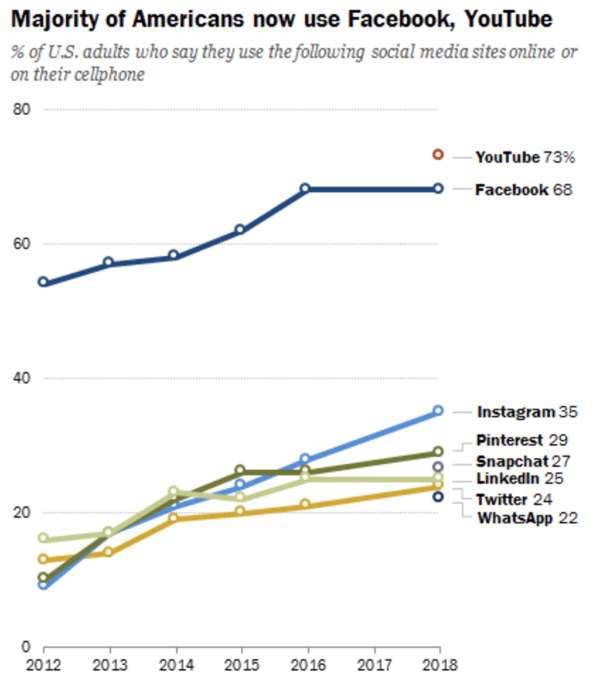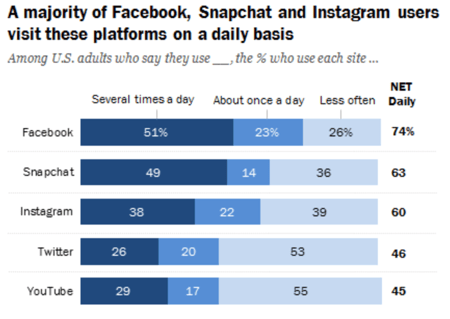
Anyone would be hard-pressed today to over-estimate the power of social media. The use of social media by consumers and business professionals alike is tightly woven throughout the fabric of our society and economy. If you own or operate a business or organization that needs to gain visibility in the marketplace, utilizing social media is no longer an option, it’s a must. Businesses really need to have a presence on social media platforms to gain any kind of traction today.
In an earlier post, we described the concept of a company’s digital footprint. The concept is quite simple. As prospects seek out businesses like yours who address a need of theirs, the prospect will research your company online.
Business social media pages serve as important platforms for sharing information. In some cases, users will research on social media, read reviews about your business and request a call or download an eBook, all from within a social media platform. The point of all of this is all businesses should create and maintain their social media presence on all of the popular platforms.
As social media as grown over the past few years, so has its complexity. There are now countless social media communities catering to every conceivable interest, profession, industry, hobby, and demographic. The choices are so numerous, they can be overwhelming. Fortunately, one of the greatest benefits of social media is that it gives you access to billions of potential impressions. You’ll want to create your social media strategy to include the basic organic methods for building an audience and also consider highly-targeted paid outreach to expand the visibility of your business.

Source: Social Media Use in 2018 by Pew Research.
Even if you’re not actively involved in social media currently, many other businesses, large and small, are -- including your competitors and most likely a significant proportion of your customers. If you don’t understand that social media is where people are holding conversations, then that means you’re not part of the discussion, and you can’t influence what customers and prospects say and think about your business. And if you don’t know what’s being said, how can you effectively manage your brand reputation online? And how can you ensure that your key messages are being heard by the people with whom you most want to engage? Creating a targeted social media strategy will help you focus on relevant platforms to connect with existing and new customers and avoid simply adding to the online noise.
 A mobile workforce and customer base, wireless technology, and the quest for convenience have all combined to create an environment in which people access, use, and share information online and on their own terms. Sales teams no longer dictate the rules of engagement with customers – the customers do. That’s why it’s likely that a significant portion of them will want to get information from you and about you via a social network.
A mobile workforce and customer base, wireless technology, and the quest for convenience have all combined to create an environment in which people access, use, and share information online and on their own terms. Sales teams no longer dictate the rules of engagement with customers – the customers do. That’s why it’s likely that a significant portion of them will want to get information from you and about you via a social network.
Deciding how to connect with customers is not a tactical decision, it’s a strategic one. Your social media presence needs to align with your other communication channels and its role defined and understood. It’s critical to have processes and tools in place to cope with demand, including the use of automation to manage consistent customer outreach and response. If you simply jump onto social media without a strategic plan, you risk inefficiency and inaccuracy, which can hurt your business.
If the first era of social media was audience building and engagement, the current era is focused on commerce and personalization. Nearly half (46%) of social media users are already using social platforms to research potential purchases. 40% of users are actively deciding what to buy based on what they have seen on social media platforms, including reviews and recommendations, and this is only set to grow.
There are subtle differences between the roles each social network plays in the purchasing journey. For example, Pinterest is a great place for people to find inspiration and works well as a visual product storyboard. Facebook is well suited to people looking to share content with consumers and both offer and find promotions. LinkedIn is the Facebook of business professionals; a social media destination for researching potential customers and competitors, industry experts, as well as partners and suppliers.
 81% of consumers’ purchasing decisions are influenced by their friends’ social media posts. (Forbes)
81% of consumers’ purchasing decisions are influenced by their friends’ social media posts. (Forbes)Every social media network has its key influencers and thought leaders. If you’re not part of their world, you risk not being relevant to them. You risk losing mindshare to more socially aware competitors who are willing to be bold and innovative in their marketing campaigns. And if none of the key social media influencers for your target audience are interested in your company and its products or services, it’s much harder to get your message across to prospects.
Malcolm Gladwell identified three types of influencers in his book "The Tipping Point:"
Depending on your brand's personality and your specific campaign goals, you need to decide which types of influencers and content you need. You may even need a combination of two or all three characteristics.
Expert endorsements also increase brand credibility. In most B2B markets, expert opinions are highly sought after and can make or break products. It’s important to remember that customer ratings and reviews on social media can increase conversion rates through the power of peer influence -- feedback from another customer is typically seen as trustworthy.
Of course, it’s even better if you are seen as an industry thought leader – and social media is a perfect tool for positioning your business as one. Highly valuable, relevant content; informative, educational blog posts; eBooks and other objective online content serve as effective tools to help you gain visibility and recognition as an industry expert.

Sharing valuable information across social media channels used by your target audience is an immediate and impactful way to gain visibility for your business. Social sharing engages your prospects, builds customer loyalty, and empowers them to become promoters of your brand.
Convinced that you should have an effective, efficient social media strategy, but still concerned that you can confidently put one together? Don’t worry, we’re here to help. Bristol Strategy works with firms just like yours to include social media as an essential element of your digital marketing program. We support social media platforms such as LinkedIn, Facebook, Twitter, YouTube, Pinterest, Instagram and others based on the preferences of your primary buyer persona (don’t know what that is? We can help with personas, too).
To learn more about crafting and implementing a social media strategy, contact us today.
Bristol Strategy is a “full funnel” inbound marketing agency and inbound sales agency offering comprehensive Inbound Marketing services that enable our clients to surpass their business objectives by transforming the way they engage with their buyers on-line. Reach out to us to learn more about how our proven processes can help your business grow.
Ask us about our unique approach that creates a full-funnel "inbound" engagement model for your business that attracts and converts digitally engaged prospects.